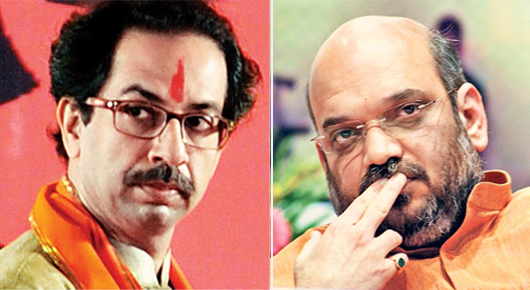New Delhi, Oct 20: The BJP on Sunday indicated that its door had not been shut on the estranged ally, Shiv Sena, and constituted a two-member team of observers comprising Union Home Minister Rajnath Singh and general secretary J P Nadda, the two leaders whom the Sena seems to prefer at the negotiating table.
 Led by Rajnath Singh, the team will first hold consultations with the newly elected party MLAs to choose their leader and then hunt for allies.
Led by Rajnath Singh, the team will first hold consultations with the newly elected party MLAs to choose their leader and then hunt for allies.
BJP sources said the move to make Singh an observer along with Nadda hints that the party is willing to renegotiate with the Sena. Ahead of the polls, Sena chief Uddhav Thackeray had said that if Singh was leading the party, the alliance would have remained intact.
However, the BJP would like the Sena to accept it as a big brother this time. To begin with, the government can be formed only after the Sena accepts its BJP candidate. To keep the Sena on tenterhooks, the party did not reject the unconditional support offered by the NCP.
At the evening meeting of the party’s highest decision making body, the parliamentary board, which is headed by president Amit Shah, the BJP tasked senior leaders M Venkaiah Naidu and Dinesh Sharma to act as observers in forming its first government in Haryana.
Rajnath Singh said the party has not yet decided on chief ministers for Maharashtra or Haryana.
Sources said Devendra Fadnavis has emerged as the frontrunner for the post in Maharashtra. Election in-charge Om Mathur offering him laddoo in Mumbai after the verdict is being seen as pointers to his popularity among probables.
Fadnavis, a Brahmin, is also close to Sena leaders.
The others following him are Eknath Khadse and Vinod Tawade. Pankaja Munde, daughter of former Union minister Gopinath Munde, has been ruled out for the top slot despite her throwing hat in the ring.
In Haryana, the names that are doing the rounds for the top slot are that of Manohar Lal Khattar, party state president Ram Bilash Sharma, who is close to the RSS, Union ministers Krishan Pal Gujjar, Rao Inderjit Singh and Capt Abhimanyu. After the meeting, Nadda told reporters about the party’s view: “The results demonstrate that the people have voted for the credible leadership of Prime Minister Narendra Modi and his four-month-old government’s welfare measures.”
Nadda equally praised the organisational skills of party president Amit Shah and said, “The poll outcome shows that the Congress has been reduced to the third place in both states due to corruption and misgovernance.”





Comments
Add new comment